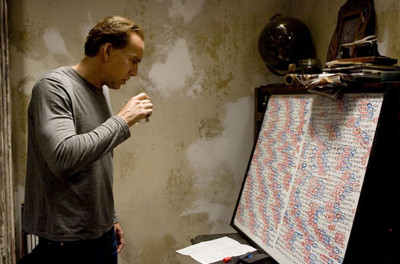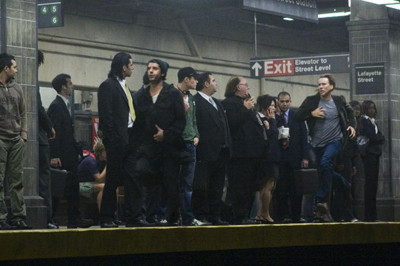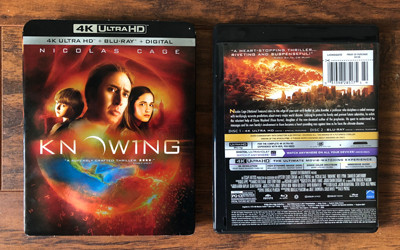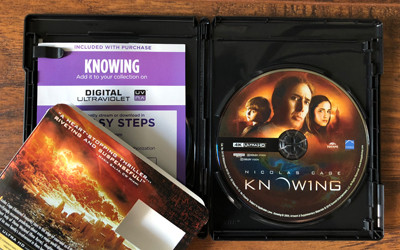| Reviews & Columns |
|
Reviews DVD TV on DVD Blu-ray 4K UHD International DVDs In Theaters Reviews by Studio Video Games Features Collector Series DVDs Easter Egg Database Interviews DVD Talk Radio Feature Articles Columns Anime Talk DVD Savant Horror DVDs The M.O.D. Squad Art House HD Talk Silent DVD
|
DVD Talk Forum |
|
|
| Resources |
|
DVD Price Search Customer Service #'s RCE Info Links |
|
Columns
|
|
|
Knowing
Lionsgate Home Entertainment // PG-13 // April 10, 2018 // Region 0
List Price: $17.99 [Buy now and save at Amazon]
The Film:
 Cinematic stories that rely on numerical connections and predetermination seem like they'd alienate a hefty portion of their audience right out of the gate, since so many people are either skeptical or outright dismissive of there being a grand design that dictates the world. Despite the math that may or may not bring sense to what's happening, an underlying degree of mysticism and spirituality cannot help but seep into their concepts, as if there's something behind-the-scenes responsible for connecting those dots and adding meaning to it all. It can also drudge up complicated, potentially dark questions about the pointlessness and powerlessness of existence, so it's not unreasonable to hope that there's more substance to the mystery beyond the ways in which events are fated to happen regardless of intervention. Knowing ties the concept of predestination to the most elevated of stakes -- disasters across the globe -- but even with its science-fiction enormity driving some highly intriguing suspense, director Alex Proyas still can't evade the outlandishness and inherent futility closing in on it.
Cinematic stories that rely on numerical connections and predetermination seem like they'd alienate a hefty portion of their audience right out of the gate, since so many people are either skeptical or outright dismissive of there being a grand design that dictates the world. Despite the math that may or may not bring sense to what's happening, an underlying degree of mysticism and spirituality cannot help but seep into their concepts, as if there's something behind-the-scenes responsible for connecting those dots and adding meaning to it all. It can also drudge up complicated, potentially dark questions about the pointlessness and powerlessness of existence, so it's not unreasonable to hope that there's more substance to the mystery beyond the ways in which events are fated to happen regardless of intervention. Knowing ties the concept of predestination to the most elevated of stakes -- disasters across the globe -- but even with its science-fiction enormity driving some highly intriguing suspense, director Alex Proyas still can't evade the outlandishness and inherent futility closing in on it.
Fifty years after its burial, a time capsule has been opened at the elementary school attended by Caleb (Chandler Canterbury), the mentally gifted son of John Koestler (Nicolas Cage), a professor of astrophysics at MIT. Within the time capsule rested a series of numbers scrawled onto a piece of paper, and after John -- a widower with something of a drinking problem -- looks at the numbers and starts doing some calculation, he begins to notice that they correlate with deadly disasters scattered across the globe … across several decades. The numbers don't simply chart the calamities that have happened in the past and present, though: if his math ends up being correct, the numbers also predict tragedies waiting to happen, along with how many people will end up dying in each one of ‘em. With resistance from the people who originally created the time capsule and from his colleagues, John scrambles to make sense of the sheet of numbers before another calamity can occur.
With time -- and a director's cut -- Alex Proyas' Dark City has transformed in status from being an inelegantly-explained curio to a science-fiction cult classic, so the director is no stranger to lukewarm receptions to his films' original theatrical showings and shifts in opinions after critical reevaluation. Oddly enough, Knowing almost seems like it was designed for this exact sort of assessment following an opening wave of indifference toward its dependence on bleakness and fate, showing confidence in the film's obscure ambitions as attention falls squarely on that sheet of paper's hastily scrawled numbers. The ominousness takes hold almost immediately, during the ‘50s, and Proyas carefully crafts a mood with shadowy visual language and John's philosophical musings about the composition of the galaxy, which effectively captures one's attention at first in how the astrophysicist begins puzzling out the meaning of the numbers. A credible escalation of his mania, coupled with less jitteriness from Nicolas Cage, starts off on a stronger note than other number parania thrillers like, uh, The Number 23.
ambitions as attention falls squarely on that sheet of paper's hastily scrawled numbers. The ominousness takes hold almost immediately, during the ‘50s, and Proyas carefully crafts a mood with shadowy visual language and John's philosophical musings about the composition of the galaxy, which effectively captures one's attention at first in how the astrophysicist begins puzzling out the meaning of the numbers. A credible escalation of his mania, coupled with less jitteriness from Nicolas Cage, starts off on a stronger note than other number parania thrillers like, uh, The Number 23.
For a while, there's a sense of urgency and intrigue in getting to know about the moving parts that propel Knowing, largely because the scale of the threat seems both sprawling yet somehow able to get under control, if the code's cracked in time. The mystery orchestrated by Proyas respects the intelligence of both the characters and the audience deciphering what's going on, deepening John's strength as a character as he anticipates how crazy he'll appear when he presents his findings to his network of colleagues. On top of that, the fundamentals of the story attach an emotional connection to John and his son with the predestined disasters, hinged on both Caleb's complicated intellect and the circumstances that left them as a single-parent family. Despite being someone who'll probably be skeptical of the idea that the universe has certain things -- especially disasters -- mapped out, Knowing not only hooked my interest on a mental level with its puzzle-solving, it also effectively crafted an expressively melancholy angle behind John's energy toward figuring it out.
Then, the enormity of what the rest of the numbers are building toward gets revealed, and Knowing in turn evolves from an ascending thriller of circumstance into a nihilistic descent into unavoidable, at-times absurd conditions and harrowing cataclysm. What was once a smoldering thriller driven by a growing unhinged academic sleuthing his way to a solution darkens into an onslaught of impotence alongside an increasingly apocalyptic mood, crafted with rich, bleak tension in mind yet weighed down by the inherent futility of the concept. Proyas would be one of the directors out there with the conceptual audacity to reach the meaning at the core of the matter and craft a gripping cinematic story from it, but as the math adds up and John's questions start to receive answers, the suspense can't avoid the long-term implications of the cosmic grand design well beyond the MIT professor's scope. Magical deus ex machina devices and superheroes don't fit into this realistic science-fiction environment, leaving humanity's fate in the hands of the wild eyes and churning mental gears of the more typical behaviors from Cage.
increasingly apocalyptic mood, crafted with rich, bleak tension in mind yet weighed down by the inherent futility of the concept. Proyas would be one of the directors out there with the conceptual audacity to reach the meaning at the core of the matter and craft a gripping cinematic story from it, but as the math adds up and John's questions start to receive answers, the suspense can't avoid the long-term implications of the cosmic grand design well beyond the MIT professor's scope. Magical deus ex machina devices and superheroes don't fit into this realistic science-fiction environment, leaving humanity's fate in the hands of the wild eyes and churning mental gears of the more typical behaviors from Cage.
Amid the growing chaos and destruction, Knowing doesn't turn away from explanations of precisely how it's all happening, leaving none of the necessary science-fiction stones unturned by the time the ending arrives. With those matters being addressed, however, Alex Proyas also invites deeper-level considerations to enter the atmosphere, hinged on the purpose behind the number sheet's existence and placement in the time capsule half a century back. The ground that the story gains as a mystery while bringing sense to what's transpiring gets lost in the rationale and purpose behind the greater perception of "WHY?" the disasters continue to happen the way they do, and the story's deliberate vagueness and ambiguity are more interested in untethered interpretation -- a conflict of science versus religion -- than articulating what's being observed. Knowing may end on a thought-provoking note, but that doesn't make it inherently satisfying, for either those who are comfortable with the idea of predestination or those who'd never warm up to the idea.
The 4K Blu-ray:
Knowing descends upon the 4K scene with a standard double-disc package from Summit Entertainment, with the UltraHD disc and standard Blu-ray disc kept in a standard black case. A shiny slipcase duplicates the front and back artwork, while a UV Digital Copy slip can also be found within.
Video and Audio:
Something that shouldn't surprise anyone who's seen Alex Proyas' earlier works, Knowing operates in heavy shadows and stylized contrast, though this real-world perspective gets him to ease up on that and settle in somewhere between the darkness of The Crow/Dark City and the brighter aspects of I, Robot. Therefore, paler skin tones and sparse vividness of color is certainly intended, but that only makes the bursts of color -- eruption of flames, for instance -- all the more striking. The standard Blu-ray offered visual delights that breached on reference material, a pattern continued by this 4K presentation, framed at 2.39:1 through a strikingly austere 2160p transfer from Summit Entertainment. Subtle skin tones creep up from the muted palette in uniquely organic ways, displaying rays of warmth underneath the sallow objectives of the color timing, while earthen tones in wood and stone exhibit some really impressive shade gradation and strength. A few obvious brighter elements, notably fiery explosions, telegraph vibrant punches that hit deep into HDR contrast pop for the fleeting time they're onscreen. Detail in scratches on walls/tables, in the shine on polished stones, and in a few ornate computer-generated effects deep into the film are exceptional, and the contrast balance, while slightly dark at times, overwhelming preserves details in darker elements.
The object-based Dolby ATMOS track for Knowing isn't consistently aggressive, as one might expect out of a thriller centered on decoding numbers and investigating their meeting, but there's a broad variety of really compelling activity throughout the film's sound design, which this track handles quite well. Whispery, eerie psychological effects and sound elements like the scratching of wood and clacking of polished stones onto one another are delivered with impeccably clarity and convincing responsiveness, across both the front and rear areas of the soundstage. There's a lot of impassioned movement going on during conversations and among crowds, and the track nimbly follows along with the activity, emphasizing razor-sharp dialogue and the natural bustle of people surrounding the subjects. When the track does require some oomph, and it most assuredly does in the later stages of the film, the vigor of bass responsiveness fills the stage with full, bold, yet carefully attuned bass response at the lower and midrange levels, adding even more impact to explosions and different types of vehicle accidents. Nothing negative can be stated about this track, really: it's a stunner when it needs to be.
Special Features:
The extras for Knowing are in short supply, but Summit have accomplished two key things with their 4K presentation: they've included all the available extras on the new UltraHD disc, and they've even managed to add one to the mix … even if it's just a little thing. Knowing: 5 Things Worth Knowing (2:01, 16x9 HD), which offers a two-minute YouTube-style bulletpoint rundown of some interesting anecdotes about the film, from the shooting location to the cameras used and the early appearances of young actors. It comes across as an extra designed for short attention spans, and doesn't include any addition behind-the-scenes footage or anything, but it's a nice little addition.
Carried over from the Blu-ray release, the Commentary with Alex Proyas remains an interesting discussion that centers more on ideas and the purpose of scenes rather than a dissection of the physical filmmaking attributes, where he delves into the logic behind the numbers on the page and how he conceptualized around a one-shot sequence for one of the centerpiece events in the film, as well as his justification for the science behind the story's core conflict. He also gets his hands dirty with the murkiness of the ending, and his perspective generates the kind of discussion that makes one appreciate the ideas just a little bit more. Summit have also carried over Knowing All: The Making of a Futuristic Thriller (12:36, 16x9 HD), a standard yet strong collection of behind-the-scenes footage and interviews that charts the film's creation, while Visions of the Apocalypse (17:15, 16x9 HD) delves into a more sprawling discussion about modern perspective on the end of the world and myths involved with them.
Final Thoughts:
The experience in watching Knowing left me wanting to embrace it as a trippy prophetic sci-fi thriller, one whose mood, pacing, and orchestrated set-pieces could overcome its perfunctory acting and any inherent conceptual misgivings. While imperfect, those elements worked because of Alex Proyas' ominous handiwork, but once the conclusion adds context to the entire turn of events, it engulfs all the craftsmanship that came before it in vague mythology and problematic futility. Questions are posed by what Proyas orchestrates, and they're felt on certain emotional levels due to the family bonds present throughout the film, but they lack the kind of satisfying focus that would tie everything together. It's an experience worth having, especially in UltraHD with a final audiovisual presentation, but it's the kind of film with questionable return value based on its overarching objectives and tolerable performance value. Rent It.
Thomas Spurlin, Staff Reviewer -- DVDTalk Reviews | Personal Blog/Site
 Cinematic stories that rely on numerical connections and predetermination seem like they'd alienate a hefty portion of their audience right out of the gate, since so many people are either skeptical or outright dismissive of there being a grand design that dictates the world. Despite the math that may or may not bring sense to what's happening, an underlying degree of mysticism and spirituality cannot help but seep into their concepts, as if there's something behind-the-scenes responsible for connecting those dots and adding meaning to it all. It can also drudge up complicated, potentially dark questions about the pointlessness and powerlessness of existence, so it's not unreasonable to hope that there's more substance to the mystery beyond the ways in which events are fated to happen regardless of intervention. Knowing ties the concept of predestination to the most elevated of stakes -- disasters across the globe -- but even with its science-fiction enormity driving some highly intriguing suspense, director Alex Proyas still can't evade the outlandishness and inherent futility closing in on it.
Cinematic stories that rely on numerical connections and predetermination seem like they'd alienate a hefty portion of their audience right out of the gate, since so many people are either skeptical or outright dismissive of there being a grand design that dictates the world. Despite the math that may or may not bring sense to what's happening, an underlying degree of mysticism and spirituality cannot help but seep into their concepts, as if there's something behind-the-scenes responsible for connecting those dots and adding meaning to it all. It can also drudge up complicated, potentially dark questions about the pointlessness and powerlessness of existence, so it's not unreasonable to hope that there's more substance to the mystery beyond the ways in which events are fated to happen regardless of intervention. Knowing ties the concept of predestination to the most elevated of stakes -- disasters across the globe -- but even with its science-fiction enormity driving some highly intriguing suspense, director Alex Proyas still can't evade the outlandishness and inherent futility closing in on it. Fifty years after its burial, a time capsule has been opened at the elementary school attended by Caleb (Chandler Canterbury), the mentally gifted son of John Koestler (Nicolas Cage), a professor of astrophysics at MIT. Within the time capsule rested a series of numbers scrawled onto a piece of paper, and after John -- a widower with something of a drinking problem -- looks at the numbers and starts doing some calculation, he begins to notice that they correlate with deadly disasters scattered across the globe … across several decades. The numbers don't simply chart the calamities that have happened in the past and present, though: if his math ends up being correct, the numbers also predict tragedies waiting to happen, along with how many people will end up dying in each one of ‘em. With resistance from the people who originally created the time capsule and from his colleagues, John scrambles to make sense of the sheet of numbers before another calamity can occur.
With time -- and a director's cut -- Alex Proyas' Dark City has transformed in status from being an inelegantly-explained curio to a science-fiction cult classic, so the director is no stranger to lukewarm receptions to his films' original theatrical showings and shifts in opinions after critical reevaluation. Oddly enough, Knowing almost seems like it was designed for this exact sort of assessment following an opening wave of indifference toward its dependence on bleakness and fate, showing confidence in the film's obscure
 ambitions as attention falls squarely on that sheet of paper's hastily scrawled numbers. The ominousness takes hold almost immediately, during the ‘50s, and Proyas carefully crafts a mood with shadowy visual language and John's philosophical musings about the composition of the galaxy, which effectively captures one's attention at first in how the astrophysicist begins puzzling out the meaning of the numbers. A credible escalation of his mania, coupled with less jitteriness from Nicolas Cage, starts off on a stronger note than other number parania thrillers like, uh, The Number 23.
ambitions as attention falls squarely on that sheet of paper's hastily scrawled numbers. The ominousness takes hold almost immediately, during the ‘50s, and Proyas carefully crafts a mood with shadowy visual language and John's philosophical musings about the composition of the galaxy, which effectively captures one's attention at first in how the astrophysicist begins puzzling out the meaning of the numbers. A credible escalation of his mania, coupled with less jitteriness from Nicolas Cage, starts off on a stronger note than other number parania thrillers like, uh, The Number 23. For a while, there's a sense of urgency and intrigue in getting to know about the moving parts that propel Knowing, largely because the scale of the threat seems both sprawling yet somehow able to get under control, if the code's cracked in time. The mystery orchestrated by Proyas respects the intelligence of both the characters and the audience deciphering what's going on, deepening John's strength as a character as he anticipates how crazy he'll appear when he presents his findings to his network of colleagues. On top of that, the fundamentals of the story attach an emotional connection to John and his son with the predestined disasters, hinged on both Caleb's complicated intellect and the circumstances that left them as a single-parent family. Despite being someone who'll probably be skeptical of the idea that the universe has certain things -- especially disasters -- mapped out, Knowing not only hooked my interest on a mental level with its puzzle-solving, it also effectively crafted an expressively melancholy angle behind John's energy toward figuring it out.
Then, the enormity of what the rest of the numbers are building toward gets revealed, and Knowing in turn evolves from an ascending thriller of circumstance into a nihilistic descent into unavoidable, at-times absurd conditions and harrowing cataclysm. What was once a smoldering thriller driven by a growing unhinged academic sleuthing his way to a solution darkens into an onslaught of impotence alongside an
 increasingly apocalyptic mood, crafted with rich, bleak tension in mind yet weighed down by the inherent futility of the concept. Proyas would be one of the directors out there with the conceptual audacity to reach the meaning at the core of the matter and craft a gripping cinematic story from it, but as the math adds up and John's questions start to receive answers, the suspense can't avoid the long-term implications of the cosmic grand design well beyond the MIT professor's scope. Magical deus ex machina devices and superheroes don't fit into this realistic science-fiction environment, leaving humanity's fate in the hands of the wild eyes and churning mental gears of the more typical behaviors from Cage.
increasingly apocalyptic mood, crafted with rich, bleak tension in mind yet weighed down by the inherent futility of the concept. Proyas would be one of the directors out there with the conceptual audacity to reach the meaning at the core of the matter and craft a gripping cinematic story from it, but as the math adds up and John's questions start to receive answers, the suspense can't avoid the long-term implications of the cosmic grand design well beyond the MIT professor's scope. Magical deus ex machina devices and superheroes don't fit into this realistic science-fiction environment, leaving humanity's fate in the hands of the wild eyes and churning mental gears of the more typical behaviors from Cage. Amid the growing chaos and destruction, Knowing doesn't turn away from explanations of precisely how it's all happening, leaving none of the necessary science-fiction stones unturned by the time the ending arrives. With those matters being addressed, however, Alex Proyas also invites deeper-level considerations to enter the atmosphere, hinged on the purpose behind the number sheet's existence and placement in the time capsule half a century back. The ground that the story gains as a mystery while bringing sense to what's transpiring gets lost in the rationale and purpose behind the greater perception of "WHY?" the disasters continue to happen the way they do, and the story's deliberate vagueness and ambiguity are more interested in untethered interpretation -- a conflict of science versus religion -- than articulating what's being observed. Knowing may end on a thought-provoking note, but that doesn't make it inherently satisfying, for either those who are comfortable with the idea of predestination or those who'd never warm up to the idea.
The 4K Blu-ray:
 |  |
Knowing descends upon the 4K scene with a standard double-disc package from Summit Entertainment, with the UltraHD disc and standard Blu-ray disc kept in a standard black case. A shiny slipcase duplicates the front and back artwork, while a UV Digital Copy slip can also be found within.
Video and Audio:
Something that shouldn't surprise anyone who's seen Alex Proyas' earlier works, Knowing operates in heavy shadows and stylized contrast, though this real-world perspective gets him to ease up on that and settle in somewhere between the darkness of The Crow/Dark City and the brighter aspects of I, Robot. Therefore, paler skin tones and sparse vividness of color is certainly intended, but that only makes the bursts of color -- eruption of flames, for instance -- all the more striking. The standard Blu-ray offered visual delights that breached on reference material, a pattern continued by this 4K presentation, framed at 2.39:1 through a strikingly austere 2160p transfer from Summit Entertainment. Subtle skin tones creep up from the muted palette in uniquely organic ways, displaying rays of warmth underneath the sallow objectives of the color timing, while earthen tones in wood and stone exhibit some really impressive shade gradation and strength. A few obvious brighter elements, notably fiery explosions, telegraph vibrant punches that hit deep into HDR contrast pop for the fleeting time they're onscreen. Detail in scratches on walls/tables, in the shine on polished stones, and in a few ornate computer-generated effects deep into the film are exceptional, and the contrast balance, while slightly dark at times, overwhelming preserves details in darker elements.
The object-based Dolby ATMOS track for Knowing isn't consistently aggressive, as one might expect out of a thriller centered on decoding numbers and investigating their meeting, but there's a broad variety of really compelling activity throughout the film's sound design, which this track handles quite well. Whispery, eerie psychological effects and sound elements like the scratching of wood and clacking of polished stones onto one another are delivered with impeccably clarity and convincing responsiveness, across both the front and rear areas of the soundstage. There's a lot of impassioned movement going on during conversations and among crowds, and the track nimbly follows along with the activity, emphasizing razor-sharp dialogue and the natural bustle of people surrounding the subjects. When the track does require some oomph, and it most assuredly does in the later stages of the film, the vigor of bass responsiveness fills the stage with full, bold, yet carefully attuned bass response at the lower and midrange levels, adding even more impact to explosions and different types of vehicle accidents. Nothing negative can be stated about this track, really: it's a stunner when it needs to be.
Special Features:
The extras for Knowing are in short supply, but Summit have accomplished two key things with their 4K presentation: they've included all the available extras on the new UltraHD disc, and they've even managed to add one to the mix … even if it's just a little thing. Knowing: 5 Things Worth Knowing (2:01, 16x9 HD), which offers a two-minute YouTube-style bulletpoint rundown of some interesting anecdotes about the film, from the shooting location to the cameras used and the early appearances of young actors. It comes across as an extra designed for short attention spans, and doesn't include any addition behind-the-scenes footage or anything, but it's a nice little addition.
Carried over from the Blu-ray release, the Commentary with Alex Proyas remains an interesting discussion that centers more on ideas and the purpose of scenes rather than a dissection of the physical filmmaking attributes, where he delves into the logic behind the numbers on the page and how he conceptualized around a one-shot sequence for one of the centerpiece events in the film, as well as his justification for the science behind the story's core conflict. He also gets his hands dirty with the murkiness of the ending, and his perspective generates the kind of discussion that makes one appreciate the ideas just a little bit more. Summit have also carried over Knowing All: The Making of a Futuristic Thriller (12:36, 16x9 HD), a standard yet strong collection of behind-the-scenes footage and interviews that charts the film's creation, while Visions of the Apocalypse (17:15, 16x9 HD) delves into a more sprawling discussion about modern perspective on the end of the world and myths involved with them.
Final Thoughts:
The experience in watching Knowing left me wanting to embrace it as a trippy prophetic sci-fi thriller, one whose mood, pacing, and orchestrated set-pieces could overcome its perfunctory acting and any inherent conceptual misgivings. While imperfect, those elements worked because of Alex Proyas' ominous handiwork, but once the conclusion adds context to the entire turn of events, it engulfs all the craftsmanship that came before it in vague mythology and problematic futility. Questions are posed by what Proyas orchestrates, and they're felt on certain emotional levels due to the family bonds present throughout the film, but they lack the kind of satisfying focus that would tie everything together. It's an experience worth having, especially in UltraHD with a final audiovisual presentation, but it's the kind of film with questionable return value based on its overarching objectives and tolerable performance value. Rent It.
|
| Popular Reviews |
| Sponsored Links |
|
|
| Sponsored Links |
|
|
| Release List | Reviews | Shop | Newsletter | Forum | DVD Giveaways | Blu-Ray | Advertise |
|
Copyright 2024 DVDTalk.com All Rights Reserved. Legal Info, Privacy Policy, Terms of Use,
Manage Preferences,
Your Privacy Choices | |||||||














